 Petzlover
Petzlover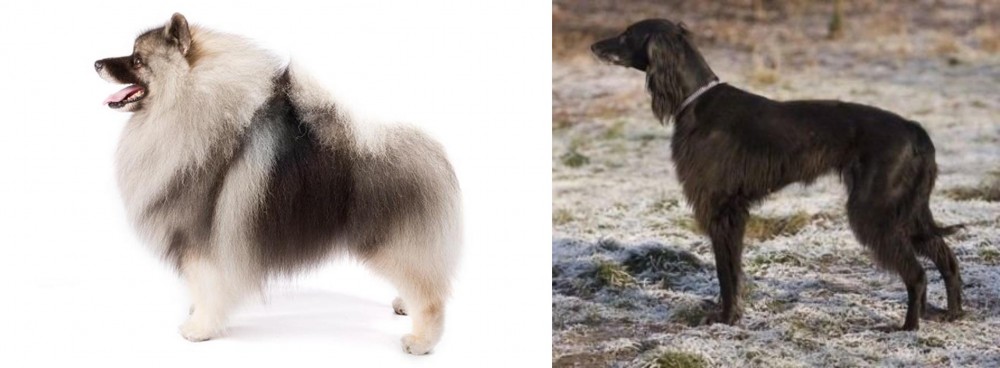 Keeshond is originated from Netherlands but Taigan is originated from Kyrgyzstan. Keeshond may grow 34 cm / 13 inches shorter than Taigan. Keeshond may weigh 16 kg / 35 pounds lesser than Taigan. Both Keeshond and Taigan has almost same life span. Both Keeshond and Taigan has same litter size. Keeshond requires Moderate Maintenance. But Taigan requires Low Maintenance
Keeshond is originated from Netherlands but Taigan is originated from Kyrgyzstan. Keeshond may grow 34 cm / 13 inches shorter than Taigan. Keeshond may weigh 16 kg / 35 pounds lesser than Taigan. Both Keeshond and Taigan has almost same life span. Both Keeshond and Taigan has same litter size. Keeshond requires Moderate Maintenance. But Taigan requires Low Maintenance
 Keeshond is the term used for German Spitzes and although many American references have it that the Keeshond originated in the Netherlands, some say the dog originated in Germany and is a member of the German Spitz family.
Keeshond is the term used for German Spitzes and although many American references have it that the Keeshond originated in the Netherlands, some say the dog originated in Germany and is a member of the German Spitz family.
The Club for German Spitzes was founded in 1899. The Nederlandse Keeshond Club was formed in 1924. The Keeshond is also referred to as ‘The Smiling Dutchman’.
It was in the 17th and 18th centuries that the Keeshond was used greatly as a watchdog, appearing in England in the late 1800s, but after the turn of the 20th century, Mrs. Wingfield Digby of Dorset, England and Mrs. Alice Gatacre, a Dutch breed authority, living in England, stirred interest in the breed with their kennels.
An English breed Club was formed in 1926, and the first Keeshond was registered with The American Kennel Club in 1930.
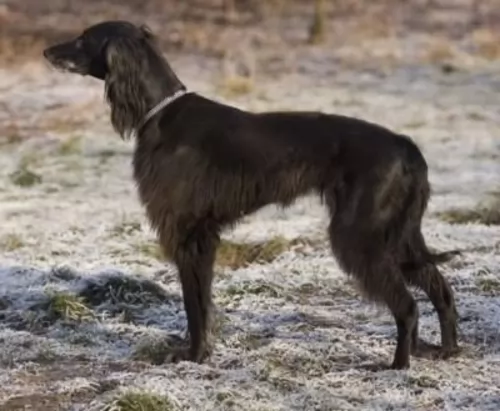 Known also as the Kyrgyzdyn Taighany, the Taigan is a sighthound dog from Kyrgyzstan. Today the dog is recognized by a number of kennel clubs,and more recently by the FCI.
Known also as the Kyrgyzdyn Taighany, the Taigan is a sighthound dog from Kyrgyzstan. Today the dog is recognized by a number of kennel clubs,and more recently by the FCI.
It was after 1991, when Kyrgyzstan became independent, that the role of the dog changed and t became a working dog again.
It was about in 1995 that a new breed standard was adopted, and since 2005 a national kennel club has existed in Kyrgyzstan.
 The Keeshond is a medium-sized dog and a member of the Spitz group of dogs. He stands at 43 – 48cm in height and weighs 14 – 18kg.
The Keeshond is a medium-sized dog and a member of the Spitz group of dogs. He stands at 43 – 48cm in height and weighs 14 – 18kg.
He has a 2-layered, dense coat which is fairly long, straight and coarse and colors are grey, silver, black and cream. His undercoat is a very light cream color. He has erect ears, a fairly shop muzzle and a feathery, plumed tail which curves over his back.
The hair on his legs is fairly short accompanied with some feathering. A typical marking-feature of the Keeshond is the dark line which runs from the outer corner of each eye to the lower corner of each ear. It's what gives the dog his well known keeshond expression. The eyes of the dog are dark brown.
The Keeshond, just like other Spitz dogs, are playful, affectionate, friendly and eager to please. He is intelligent too and will respond well to training and socialization.
He makes a wonderful family pet as he is friendly and playful with children, loving all their games. He gets on well with other pets too. He is a social dog, thriving on being with his human family, wanting to participate in all family activities.
They are sensitive, loving pets and become very attached to their owners. They have even been used as comfort dogs in rescue situations, as they bond so well with people.
He makes a good watchdog too with his loud bark which he uses to deter intruders. He may well be a good watch- and guard dog but he isn't an aggressive dog.
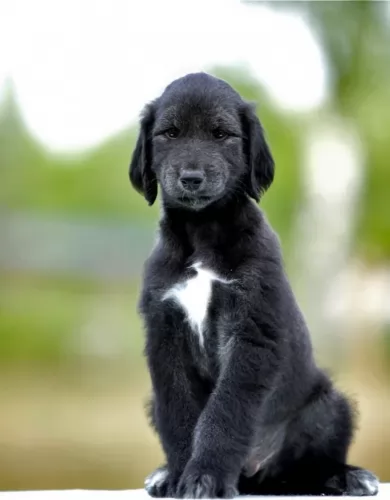 The Taigan is a large dog, looking much like a Grehound. He stands at between 55 and 82cm in height and weighs about 25 - 34kg.
The Taigan is a large dog, looking much like a Grehound. He stands at between 55 and 82cm in height and weighs about 25 - 34kg.
He has that typical slender body and slender head of the greyhound. The coat of the dog is medium length and somewhat curly and can be many colours, sometimes even bi-colored – cream, black and white, brown, grey or yellow.
During the Winter the coat can become long and thick. The ears are floppy and covered with wavy fur. The tail is long and a distinguishing mark of the dog is the way the end of the tail coils up into a ring.
These dogs can’t be kept in small city properties – they are used to wide open spaces.
An intelligent breed, the Taigan will readily learn some basic commands to make him well mannered and obedient. He is strong willed and independent, so it will be beneficial to have him trained.
He also makes a good watchdog. He is an even-tempered dog and he enjoys human companionship although he is somewhat reserved with strangers. Even so, he will still need a strong, firm owner as he is strong-willed and independent and likes to go his own way.
He is able to get along well with children in the home and other pets. Being a fairly large dog, and one that likes to run, he is better suited to large properties in the countryside as opposed to living in the city.
 The Keeshond, with his thick double coat, loves to be outdoors in cool weather. He won't be there too long however, because he will be missing his human family. He is such a social dog, craving human company and therefore isn't a dog to be put out in the backyard and left day after day.
The Keeshond, with his thick double coat, loves to be outdoors in cool weather. He won't be there too long however, because he will be missing his human family. He is such a social dog, craving human company and therefore isn't a dog to be put out in the backyard and left day after day.
He loves games and being totally involved with his human family. Look after your Keeshond well – he is a companion dog - and you will find him to be a most exceptional friend of yours.
 With good food, fresh water, exercise and lots of interaction with your Keeshond, he can reach 12 to 14 years of age.
With good food, fresh water, exercise and lots of interaction with your Keeshond, he can reach 12 to 14 years of age.
No matter how healthy your dog is, he can still get ill, but the chances are less likely when he is feed nutritionally. Nonetheless look out for hip dysplasia, bloat, ear infections, skin rashes and eye diseases.
This is a problem in the lens of the eye. Your dog has a cloudy look to the eye. A cataract can occur when the cells are damaged. A disease such as diabetes can also cause a cataract and high blood sugar levels can change the metabolism of the cells in the lens.
The lens should be crystal clear, but with a cataract, the vision of the dog is obscured. It can cause blindness. Thankfully, cataracts aren't painful and most times dogs with cataracts can still see. There is the option of surgery to remove them too.
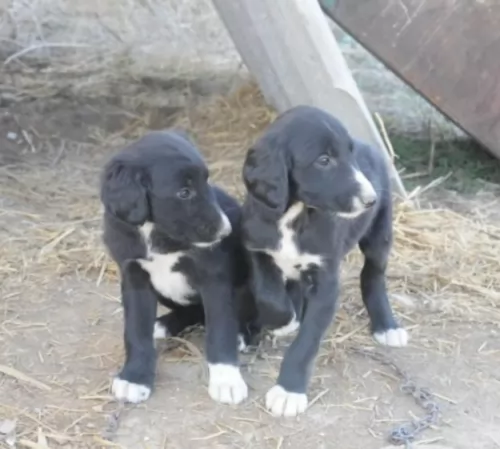 Any dog, no matter how healthy they may appear to be, can encounter any one of the many common dog illnesses there are. It is highly unlikely that your Taigan will experience these health issues but it’s good to be aware of some of them -
Any dog, no matter how healthy they may appear to be, can encounter any one of the many common dog illnesses there are. It is highly unlikely that your Taigan will experience these health issues but it’s good to be aware of some of them -
Also known as osteosarcoma, bone cancer is more commonly seen in large dogs of any breed. It’s a cancer which spreads rapidly through the body and it is terribly sad that the prognosis for your dog is poor.
You might notice swelling, joint pain and lameness and your dog will appear to always be tired. Sometimes you might see a growth. Your vet might do x-rays and if you catch it early, you can give your pet a longer lease on life.
 With his double coat, your Keeshond will need regular brushing to get rid of all those loose hairs. He is a dog which doesn't have that typical dog odor about him so bathing him is discouraged. Too much bathing irritates a dog's skin and dries it out.
With his double coat, your Keeshond will need regular brushing to get rid of all those loose hairs. He is a dog which doesn't have that typical dog odor about him so bathing him is discouraged. Too much bathing irritates a dog's skin and dries it out.
Check the inside of his mouth and make sure that his teeth are in a healthy state. If you are unsure, speak to your vet about dental hygiene as bad teeth won't only cause pain and discomfort for your pet, the teeth can affect his immune system and other body parts.
Check his claws too and have them cut when they become too long. When they are long they can hook on things and injure the sensitive area of the paws.
The Keeshond is a sturdy dog, loving all the activities and games that his family are involved in. He will love to be your walking companion and looks forward to his walk every day.
He is such a playful, adventurous dog and is always willing to join you in new games. Never put him in your back garden and forget about him, as this will make him ill and depressed. He must be part of the family to be healthy and happy and relies on you to include him in all your activities. He can live in the city or the countryside but will require being exercised wherever he is.
Top quality dry kibble will work for your Keeshond. If you want to keep him bright eyed and bushy tailed, mix in some quality home-made food too such as cooked chicken, rice and vegetables. You can also try to sometimes include a little bit of raw meat as well.
He is an active dog and will need a diet high in protein. Also, his thick coat needs to be maintained, and apart from regular brushing, look for quality dog foods that have Omega-3 fatty acids in them so as to maintain the skin and coat of the dog. Make sure he always has access to fresh, cool water.
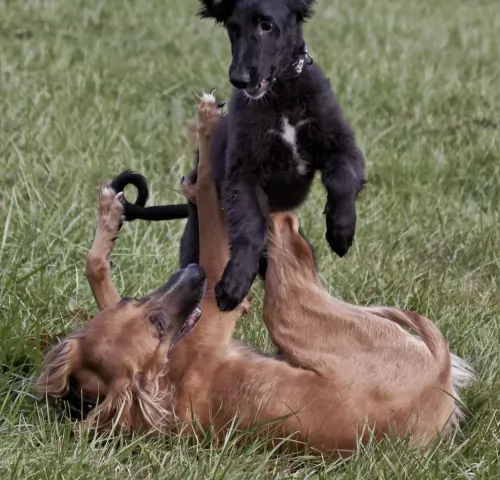 If you feed him one of the commercially manufactured dog foods, make sure its for a large, active dog breed and that it has a good list of ingredients. There are bad packaged dog foods and you want to avoid these. They are devoid of vitamins and minerals.
If you feed him one of the commercially manufactured dog foods, make sure its for a large, active dog breed and that it has a good list of ingredients. There are bad packaged dog foods and you want to avoid these. They are devoid of vitamins and minerals.
Read the packaging to see how much food to give. Also try and give your dog some home-made food too. Make sure it isn’t spicy, exotic foods. Stick to simple, wholesome foods such as boiled chicken, brown rice or pasta, sweet potatoes, spinach and carrots. Chop the food up and mix it into the dry kibble twice a week or so as a treat.